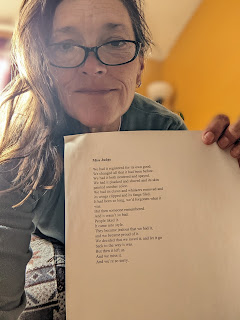When I was a youngster, I conjured an invisible friend that I called Francine. My parents cultivated this distraction, likely because our family was slightly lopsided: my two siblings were over 3 and 4 years younger than me and therefore I was typically in a different state of development and our house was hectic. Francine was a ready caretaker for some of my needs. I cannot completely produce authentic memories of us together, since much of what lasts about her comes from my parents talking about my imaginary friend rather than my own pretending.
My girlhood was peppered with all kinds of social and civic activities. I attended summer camps, played sports, retained membership in Camp Fire Girls through high school and participated in Methodist Youth Fellowship. These were great ways for me to immerse in friendships that were based on activities. Even today I sometimes have trouble just hanging-out with even the coolest people and I am eager to do something. I'm working on being more present, both as a yogi and a person.
The two Francine poems were written in Marrakech, when I was a Peace Corps Volunteer, 1986-88. They go together because one is written to Francine, and the other from her. It's interesting that Francine voices an Eastern philosophy that I lifted from TS Eliot's The Waste Land. "Datta, Dayadhvam, Damyata" comes from the Upanishads, and I find that it translates to "Give, Sympathize, Control," which horrifies, given Eliot's Nazi connections. Oh, to know then what I do now.
My earlier iteration was trying to sort out my feelings about social groups and my own need for solitude. Francine was telling me to be more giving but I sense she was also stuck in ancient dogma and male-domination. I am finding myself compassionate toward the naivete of my early 20's in these two texts and I reflect upon some of the prophecies in her words and those of Francine.
Soothe Francine
You played with me at the well, me telling
you things and you listening, endlessly.
It was you who fell, and me, promising
hickory nuts, shelled on the sidewalk with
a hammer or rock, who soothed. You were m
friend, quietly, and my confidant, scapegoat,
and means for me to hear my early voice.
Are you as old as I am now? Or do
imaginary friends shrink into time
necvr growing once they're dispelled: I think
you've never left me although the well looks
smaller and hickory nuts fall unshelled
on the new grass. Please, let me tell you things
again, and listen, Francine, endlessly,
because I want to soothe you back to life.
I need a means to hear my later voice.
A Letter from Francine
(Datta, Dayadhvam, Damyata)
Dear friend, your demands of others, tangled in words,
should be given freely in the meaning of your
deeds. Give them consistency, clear light, kindness and
repose. You observe. you record. You react. Give.
New people disappoint you, sister, why? You know
guilt, pain, frustration and anguish. You feel. You feel!
But sympathize. Elude duty; perform and lurk.
Feel suchness elsewhere, a redirected scope: there.
But you do not think on these things, preferring to
scan those disappointing others, ('help me,') thwarting
your urge to stimy yourself in you own freely-
chosen, appropriae control. Who will help them?
Concentrate, search and hurt. Meditate, learn and know.
Being and become. We are both such. Love, Francine.








